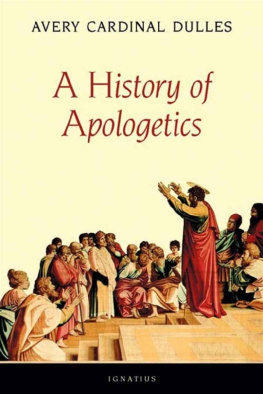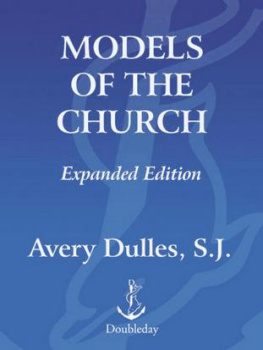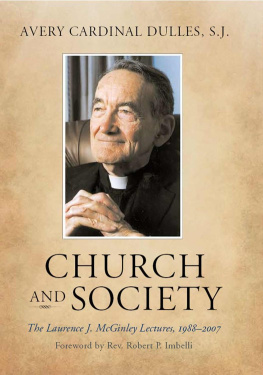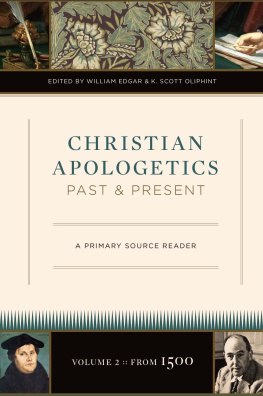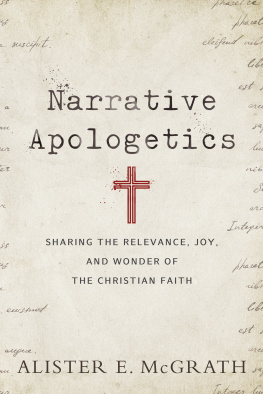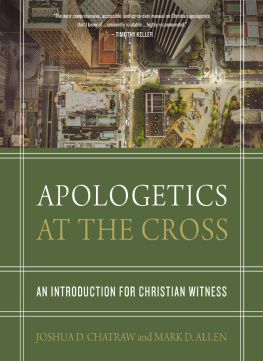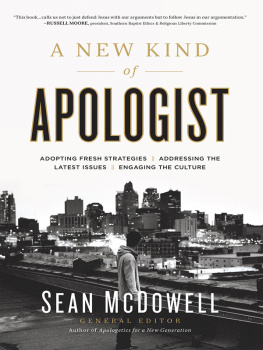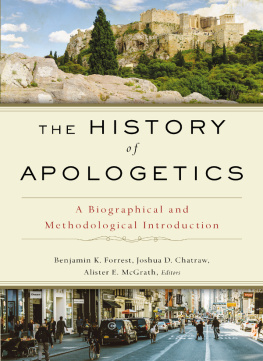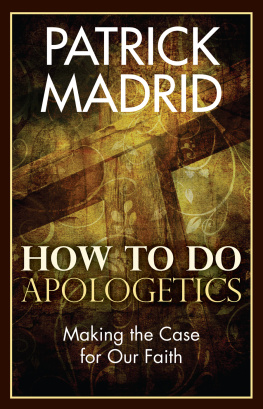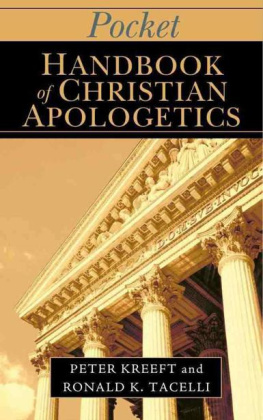A HISTORY OF APOLOGETICS
The Apologists Evening Prayer
From all my lame defeats and oh! much more
From all the victories that I seemed to score;
From cleverness shot forth on Thy behalf
At which, while angels weep, the audience laugh;
From all my proofs of Thy divinity,
Thou, who wouldst give no sign, deliver me.
Thoughts are but coins. Let me not trust, instead
Of Thee, their thin-worn image of Thy head.
From all my thoughts, even from my thoughts of Thee,
O thou fair Silence, fall, and set me free.
Lord of the narrow gate and the needles eye,
Take from me all my trumpery lest I die.
C. S. Lewis
AVERY CARDINAL DULLES
A HISTORY
OF
APOLOGETICS
MODERN APOLOGETICS LIBRARY
IGNATIUS PRESS SAN FRANCISCO
First edition published by
Corpus Instrumentorum, 1971
Published in 1999 by
Wipf and Stock Publishers, Eugene, Oregon
1999 by the Provincial of the New York Province of the Society of Jesus
Unless otherwise noted, all Scripture quotations (except those within citations) have been taken from the Revised Standard Version of the Holy Bible, Catholic Edition. The Revised Standard Version of the Holy Bible: the Old Testament, 1952; the Apocrypha, 1957; the New Testament, 1946; Catholic Edition of the Old Testament, incorporating the Apocrypha 1966; The Catholic Edition of the New Testament, 1965, by the Division of Christian Education of the National Council of the Churches of Christ in the United States of America. The author has used the Oxford University Press edition of the Revised Standard Version, 1965, 1977 by Oxford University Press.
Epigraph: The Apologists Evening Prayer, by C. S. Lewis in Poems , edited by Walter Hooper. London: G. Bles, 1964.
Cover art:
Saint Paul Preaching at Athens . Tapestry (detail)
Raphael (14831520) Palazzo Ducale, Mantua, Italy
Scala / Art Resource, New York
Cover design by Roxanne Mei Lum
2005 by Ignatius Press, San Francisco
All rights reserved
ISBN 978-0-89870-933-9 (PB)
ISBN 978-1-64229-036-3 (EB)
Library of Congress Control Number 2002105 233
Printed in the United States of America
CONTENTS
The Earliest Preaching
Apologetic Development
The Ascension
The Passion
The Origins of Jesus
The Public Life
The Miracles of Jesus
Acts
Paul
Hebrews
Mark
Matthew
Luke-Acts
John
Germany
Denmark
Great Britain
France
Germany
Spain and Italy
England
The United States
France and Belgium: Vatican Council I
Germany
Germany
The English-Speaking Countries
Blondel and the Modernists
Credibility and Apologetics: Scholastic Controversies in France
The Refutation of Rationalism
The Apologetics of Restoration
Teilhard de Chardin
German Apologists
Dialectical Theology
Germany
England
North America
Vatican II
The Debate about Method
Evidentialist Apologetics
Dynamism of the Subject
Luminosity of the Object
Catholic Apologetics toward the Close of the Century
Ambivalence about Apologetics
Secular Theology
Historical Criticism and Evidence
Renewal in Anglo-American Evangelicalism
The Classical Method
The Evidential Method
The Cumulative Case Method
Presuppositional Apologetics
Reformed Epistomology
Growing Protestant-Catholic Convergences
Christian Faith, Philosophy, and Science
FOREWORD
by Timothy George
In the fall of 1936 a bright, handsome young man, fresh from one of the leading prep schools in New England, began his undergraduate studies at Harvard College. Had the Harvard application form asked for religious affiliation, he would have marked Protestant for he came from a long line of Presbyterians and his mother had taught him to say the Lords Prayer as a little boy. But, like many other students before and since, his nominal attachment to the Christian faith had left him bereft of any serious religious convictions. He no longer believed that the cosmos had been brought into being by an intelligent and purposive Creator or that the human soul had any destiny to look forward to except that of oblivion or that there was any real moral meaning to life except the kind of utilitarian ethics based on the pleasures and preferences of this or that person or community. Avery Dulles was an atheist.
However, like many other seminal shapers of Christian thought, including Justin Martyr, St. Augustine, and C. S. Lewis, Dulles was led through the study of philosophy to question the certitude of his doubts and denials. Aristotle taught him to appreciate the dignity of reason and to see the design at the heart of the created world. Through Plato he came to see that moral valuesthings true and beautiful and goodwere more than mere whims of preference; they had an objective basis in that which was ultimately real. All of this came together for him one gray rainy February afternoon when he left his carrel in Widener Library (where he had been reading a chapter from St. Augustines City of God that he had been assigned in a course on medieval history) and began to trudge through the melting snow and mud along the banks of the Charles River:
As I wandered aimlessly, something impelled me to look comtemplatively at a young tree. On its frail, supple branches were young buds attending eagerly the spring which was at hand. While my eye rested on them the thought came to me suddenly, with all the strength and novelty of a revelation, that these little buds in their innocence and meekness followed a rule, a law of which I as yet knew nothing. How could it be, I asked, that this delicate tree sprang up and developed and that all the enormous complexity of its cellular operations combined together to make it grow erectly and bring forth leaves and blossoms? The answer, the trite answer of the schools, was new to me: that its actions were ordered to an end by the only power capable of adapting means to endsintelligenceand that the very fact that this intelligence worked toward an end implied purposivenessin other words, a will. It was useless, then, to dismiss these phenomena by obscurantist talk about a mysterious force of Nature. The nature which was responsible for these events was distinguished by the possession of intellect and will, and intellect plus will makes personality. Mind, then, not matter, was as the origin of all things. Or rather not so much the mind of Anaxagoras as a Person of Whom I had had no previous intuition.
This epiphany was for Dulles not so much a moment of mystical illumination as an insight or recognition of the then-and-thereness of the created order and of the reality that sustains and governs it by a beneficent providence, the same reality Dante referred to as the Love that moves the Sun and the other stars. In time, through personal friendships, through the study of the Holy Scriptures, through the witness of a believing community, Avery Dulles would learn the name of that Love: Jesus Christ, the Son of Man of the four canonical Gospels, the eternal Son of the heavenly Father, God of God, Light of Light, very God of very God, the Savior of the world, the Lord of the Church, the coming King and Judge of all.
Avery Cardinal Dulles is the first United States born theologian to be made a Cardinal of the Roman Catholic Church without having first served as a bishop. A History of Apologetics , magisterial in its scope, represents the ripe vintage of a productive life of theological labor and the fruit of a personal pilgrimage of faith in search of understanding. Beginning with the New Testament documents themselves and moving through the successive eras of Church history, Cardinal Dulles presents the drama of apologetics as the story of Christian Faiths encounter with various challenges and threats both within and from its environment and the secular culture.
Next page
